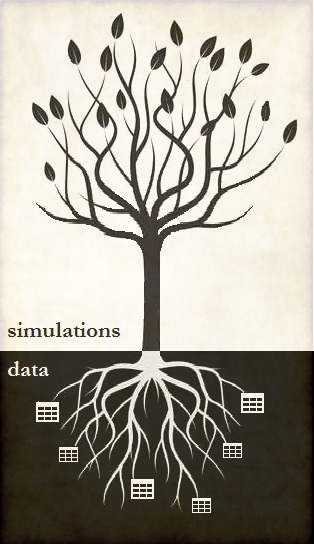Functionality
Research paper about Tree of Knowledge
To find out about Tree of Knowledge's functionality we suggest signing up (top right of this screen) and trying it out. It is free for everyone to use. The user accounts are only for personalisation and to identify users who are being actively harmful to the holistic model.
Anyway, here is what you can do with Tree of Knowledge:
Model your system
Whether you are interested in international trade, a country's macroeconomic developments or consumer behaviour - whatever your system of interest - you can model your system in less than 10 minutes. All you need to do is set the scene i.e. through drag&dropping, specify the agents/actors of the system and how they relate and press 'play' to observe the system unfold. To improve the model, you can easily change the agents' initial values and the default behaviour, which the system provided.Evaluate models
If you upload data relating to your system to the knowledge base, Tree of Knowledge will automatically use this data to score the simulation, set the initial values of the agents to those of your system and refine the simulation rules.Understand your system
In the analysis environment you can gain a full understanding of your system by watching the simulations unfold. You can inspect any aspect of the simulations.Test hypotheses
To check whether a relation or causal dependency holds, you only have to formulate it as a new rule. The system automatically learns with what probability this new rule holds.Make predictions
To see what the future will look like, you only need to run the simulation. Due to the Bayesian probability distributions and Monte-Carlo simulations, there are accurate error-margins for all predictions.Simulate new scenarios
You can easily simulate new scenarios, by changing some of the initial values e.g. a tax rate or the price of a product.Find optimum strategies
This has not been implemented yet, but in future you will be able to e.g. determine the best tax rate or price of a product. For this you have to specify what you want to optimize for and the system learns which tax rate/product price optimizes this metric.
Revolutionize Social Sciences
